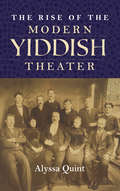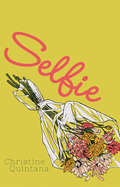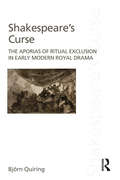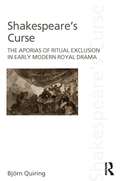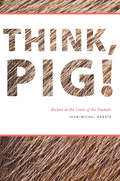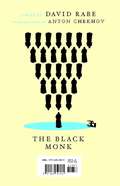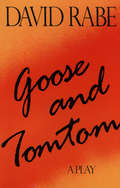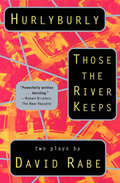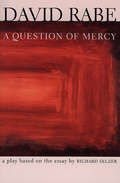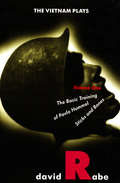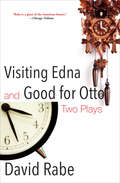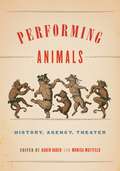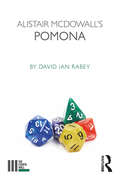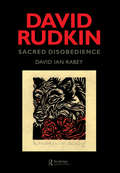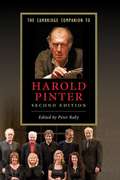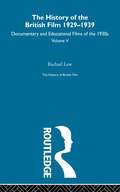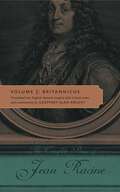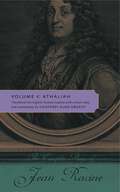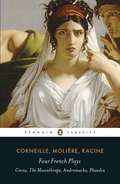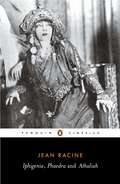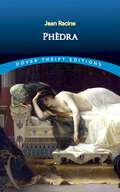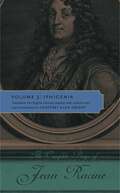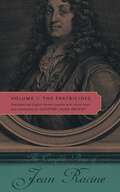- Table View
- List View
The Rise of the Modern Yiddish Theater: Avrom Goldfaden And The Jewish Stage (Jews Of Eastern Europe Ser.)
by Alyssa QuintJewish Book Award Finalist: &“Turns the fascinating life of Avrom Goldfaden into a multi-dimensional history of the Yiddish theater&’s formative years.&” —Jeffery Veidinger, author of Jewish Public Culture in the Late Russian Empire In this book, Alyssa Quint focuses on the early years of the modern Yiddish theater, from roughly 1876 to 1883, through the works of one of its best-known and most colorful figures, Avrom Goldfaden. Goldfaden (né Goldenfaden, 1840-1908) was one of the first playwrights to stage a commercially viable Yiddish-language theater, first in Romania and then in Russia. Goldfaden&’s work was rapidly disseminated in print and his plays were performed frequently for Jewish audiences. Sholem Aleichem considered him as a forger of a new language that &“breathed the European spirit into our old jargon.&” Quint uses Goldfaden&’s theatrical works as a way to understand the social life of Jewish theater in Imperial Russia. Through a study of his libretti, she looks at the experiences of Russian Jewish actors, male and female, to explore connections between culture as artistic production and culture in the sense of broader social structures. Quint explores how Jewish actors who played Goldfaden&’s work on stage absorbed the theater into their everyday lives. Goldfaden&’s theater gives a rich view into the conduct, ideology, religion, and politics of Jews during an important moment in the history of late Imperial Russia.
Selfie
by Christine QuintanaA new year of high school is full of excitement and potential—but three teens didn’t expect it to bring such a dark change to their lives. After spending a summer reinventing herself in Paris, Emma is ready for her new life to start, while her best friend Lily is eager for them to reconnect. Lily throws a last-minute party fuelled by alcohol and Instagram, which leads to a long-awaited encounter between Emma and Lily’s older brother Chris. But the next day Emma feels that something went terribly wrong. When a doctor’s appointment and a visit from police confirm that there was a sexual assault at the party, and the whole school turns against Emma, the three friends grapple with what actually happened between Emma and Chris. This smart and intense play about the complexities of relationships and community opens up a much-needed conversation about the nature of consent.
Shakespeare's Curse
by Bjoern QuiringConceptualizing the curse as the representation of a foundational, mythical violence that is embedded within juridical discourse, Shakespeare’s Curse pursues a reading of Richard III, King John, and King Lear in order to analyse the persistence of imprecations in the discourses of modernity. Shakespeare wrote during a period that was transformative in the development of juridical thinking. However, taking up the relationship between theatre, theology and law, Bjoern Quiring argues that the curse was not eliminated from legal discourses during this modernization of jurisprudence; rather, it persisted and to this day continues to haunt numerous speech acts. Drawing on the work of Derrida, Lacan, Walter Benjamin and Giorgio Agamben, among others, Quiring analyses the performativity of the curse, and tracks its power through the juristic themes that are pursued within Shakespeare’s plays – such as sovereignty, legitimacy, succession, obligation, exception, and natural law. Thus, this book provides an original and important insight into early modern legal developments, as well as a fresh perspective on some of Shakespeare’s best-known works. A fascinating interdisciplinary study, this book will interest students and scholars of Law, Literature, and History.
Shakespeare's Curse: The Aporias of Ritual Exclusion in Early Modern Royal Drama
by Björn QuiringConceptualizing the curse as the representation of a foundational, mythical violence that is embedded within juridical discourse, Shakespeare’s Curse:The Aporias of Ritual Exclusion in Early Modern Royal Drama pursues a reading of Richard III, King John, and King Lear in order to analyse the persistence of imprecations in the discourses of modernity. Shakespeare wrote during a period that was transformative in the development of juridical thinking. However, taking up the relationship between theater, theology and law, Björn Quiring argues that the curse was not eliminated from legal discourses during this modernization of jurisprudence; rather, it persisted and to this day continues to haunt numerous speech acts. Drawing on the work of Derrida, Lacan, Walter Benjamin and Giorgio Agamben, among others, Quiring analyses the performativity of the curse, and tracks its power through the juristic themes that are pursued within Shakespeare’s plays – such as sovereignty, legitimacy, succession, obligation, exception, and natural law. Thus, this book provides an original and important insight into early modern legal developments, as well as a fresh perspective on some of Shakespeare’s best known works. A fascinating interdisciplinary study, this book will interest students and scholars of Law, Literature, and History.
Think, Pig!: Beckett at the Limit of the Human
by Jean-Michel RabatéThis book examines Samuel Beckett’s unique lesson in courage in the wake of humanism’s postwar crisis—the courage to go on living even after experiencing life as a series of catastrophes. Rabaté, a former president of the Samuel Beckett Society and a leading scholar of modernism, explores the whole range of Beckett’s plays, novels, and essays. He places Beckett in a vital philosophical conversation that runs from Bataille to Adorno, from Kant and Sade to Badiou. At the same time, he stresses Beckett’s inimitable sense of metaphysical comedy. Foregrounding Beckett’s decision to write in French, Rabaté inscribes him in a continental context marked by a “writing degree zero” while showing the prescience and ethical import of Beckett’s tendency to subvert the “human” through the theme of the animal. Beckett’s “declaration of inhuman rights,” he argues, offers the funniest mode of expression available to us today.
The Black Monk and The Dog Problem: Two Plays
by David RabeThe Black Monk has been called a singular "collaboration" between two writers: Anton Chekhov and David Rabe. Based on Chekov's novella of the same name, Rabe's brilliant stage adaptation tells the story of Kovrin, the young philosophy student who returns from Moscow to the estate owned by Pesotsky, where he spent his youth. Kovrin and Pesotsky's daughter, Tanya, soon fall in love and plan to marry. But the appearance of an emissary from the unknown -- the black monk -- threatens to have a devastating effect on all of them. Trouble starts in when Teresa tells her brother Joey that this guy Ray did something to her with his dog in bed. Nobody seems to know exactly what happened, but they do know that somebody's got to pay. So what is The Dog Problem? It starts with being born into a world where the wrong thing said to the wrong person ignites a chain reaction of misplaced passions and galloping sentences that race to a deadly conclusion. The playful title is revealed to be a wry pun on the Cartesian mind/body problem, as Uncle Mal, the aging mobster, must face his turn to be the dog in this darkly funny play about men, women, sex, betrayal, and ghosts. Vastly different in their aesthetic, these two recent and highly praised plays embody all of the celebrated hallmarks of David Rabe's writing and art: unflinchingly honest and perceptive themes, starkly luminous dialogue, and the unsettling humor that have made him an icon of the American theater for more than forty years.
Goose and Tomtom: A Play (Books That Changed the World)
by David Rabe&“[A] violent, surrealist romp&” from the Tony Award–winning playwright of Hurlyburly and Visiting Edna (The Brown Daily Herald). David Rabe explores the struggle between hope and anguish in the human spirit in this story of two small-time jewel thieves united in a strangely unsettling friendship and the constant fight to prove to themselves and others how tough they are. But when their frantic scheming suddenly begins to betray them in mysterious ways, they find themselves trapped into a kidnapping and a murder over which they seem to have no control. Or do they? David Rabe&’s language creates and recreates reality in constantly surprising ways, magically dramatizing the danger of the power of illusion—and the illusion of power—with force and insight. &“A potluck smorgasbord of surrealism, dream soliloquies, science fiction, noir potboiler and fairy tales, with the ghosts of such other writers as David Mamet, Harold Pinter, Sam Shepard and even novelist Thomas Pynchon hovering nearby . . . boasts ample proof of a top-notch writer at work.&” —Chicago Tribune &“A fast-paced, visceral work with a manic, anarchic energy . . . a chaotic examination of power and powerlessness in a frightening, irrational universe.&” —The Brown Daily Herald &“[A] surrealist, hilarious, mind-fuck of a play . . . a wild, high-energy ride through plot and action.&” —LAist Praise for David Rabe &“Few contemporary dramatists have dealt with violence, physical and psychological, more impressively than Rabe.&” —Kirkus Reviews &“A remarkable storyteller.&” —Chicago Tribune &“Rabe&’s mastery of dialogue is the equal of Pinter and Mamet put together.&” —The Boston Globe.
Hurlyburly and Those the River Keeps: Two Plays (Books That Changed the World)
by David RabeThe landmark American play—and its prequel—from the Tony Award–winning author of Sticks and Bones and In the Boom Boom Room. Nominated for the Tony Award when it was first produced in 1984, Hurlyburly was immediately hailed as a classic American drama. This edition is the definitive version of David Rabe&’s most celebrated work, reflecting his continued exploration of the play through several productions—in particular the one he directed in 1988 at the Westwood Playhouse in Los Angeles—and his latest thoughts regarding the text. With Those the River Keeps, the prize-winning playwright embarks on an intense psychological exploration of Hurlyburly&’s most dangerous and enigmatic character. This edition contains the definitive versions of these works, a foreword in which Rabe examines the interwoven relationship of the plays, and an afterword in which he discusses the process of their construction. &“Fresh, glittering, entertaining, full of wit and blisteringly funny. A stunning comic drama of contemporary life in the Hollywood hills and beyond.&” —USA Today &“Powerfully written . . . dazzling.&” —The New Republic &“Offers some of Rabe&’s most inventive writing.&” —The New York Times &“Compelling . . . Those the River Keeps&’ strength is its dialogue, which ranges from staccato nonsense to amorphous bursts of palooka philosophy and raw anguish . . . masterfully rendered.&” —The Boston Phoenix Praise for David Rabe &“Few contemporary dramatists have dealt with violence, physical and psychological, more impressively than Rabe.&” —Kirkus Reviews &“A remarkable storyteller.&” —Chicago Tribune &“Rabe&’s mastery of dialogue is the equal of Pinter and Mamet put together.&” —The Boston Globe
A Question of Mercy: A Play Based on the Essay by Richard Selzer (Books That Changed the World)
by David RabeThe Tony Award–winning playwright of Hurlyburly &“confronts the timely topic of assisted suicide . . . an affirmation of dignity that rings clear and true&” (Variety). David Rabe is one of America&’s finest dramatists. In A Question of Mercy, he explores the controversial and emotional issue of euthanasia, delving deep into the ties that bind friends and lovers. Thomas and Anthony are lovers struggling with Anthony&’s final, exhausting battle with AIDS. Joined by their friend Susanah and a retired doctor, whose help Thomas has requested, they fashion a heartbreaking friendship as they work through the stages of a plan to relieve Anthony of his illness and his life. Rabe creates a passionate depiction of four people confronted with the reality of a loved one&’s fight with death and a compelling dramatic event that poses the question: &“What would you do?&” &“A moving and enlightening experience.&” —Backstage &“Completely gripping. This life and death tale questions the moral implications involved with assisted suicide, and the honor behind the action. A serious and provocative night at the theatre.&” —Theasy Praise for David Rabe &“Few contemporary dramatists have dealt with violence, physical and psychological, more impressively than Rabe.&” —Kirkus Reviews &“A remarkable storyteller.&” —Chicago Tribune &“Rabe&’s mastery of dialogue is the equal of Pinter and Mamet put together . . . full of a measured Mafia formality played against Jacobean terrors, blood lust, horror and revenge raised to an unlikely poetry dazed by equally unlikely insights.&” —The Boston Globe
The Vietnam Plays: The Basic Training of Pavlo Hummel and Sticks and Bones (Books That Changed the World)
by David Rabe&“The only Vietnam plays to appear on Broadway while the war was raging&” from the Tony Award–winning playwright of Hurlyburly (Observer). David Rabe has been a major voice and crucial force in American drama since 1971 when, in the midst of the Vietnam War, he startled the nation with The Basic Training of Pavlo Hummel. The story of a native recruit&’s initiation into war, it is by turns brutal and hilarious. It won the young playwright an Obie and was hailed by The New York Times as &“rich humor, irony, and insight.&” More than four decades later, Rabe continues to be one of our most compelling dramatists. In this, the first of two volumes of The Vietnam Plays, Pavlo Hummel is paired with the equally intense Sticks and Bones, in which a blinded Vietnam veteran returns home numbed by the war and is astonished by his family&’s inability to comprehend their country&’s politics and his rage. &“Pavlo won Al Pacino a Tony, and Sticks and Bones won one for its Harriet, Elizabeth Wilson—plus a nomination for its Oz, Tom Aldredge. It also won the Best Play Tony&” (Observer). &“Defies a million slogans to become a contemporary masterpiece.&” —The Harvard Crimson on The Basic Training of Pavlo Hummel &“Sticks and Bones is still a searing critique of America&’s willful ignorance in the face of an ultra-violent international war machine operating in our name.&” —TheaterMania &“This scalding work scores direct hits on the stubborn obliviousness of the folks back home to the realities of that dirtiest of 20th century wars.&” —The Hollywood Reporter on Sticks and Bones
Visiting Edna and Good for Otto: Two Plays
by David RabeTwo plays exploring the struggle of mental illness by the Tony Award–winning “giant of American theater” and author of Hurlyburly (Chicago Tribune). Good for Otto, which premiered in October 2015 at the Gift Theatre in Chicago, is a “sprawling drama of mental illness” in which “Mr. Rabe digs into his subject with a depth that almost feels bottomless.” Drawing on material from Undoing Depression by psychotherapist Richard O’Connor, it explores the lives of a therapist and his many patients, all trying to navigate personal trauma (Charles Isherwood, The New York Times). Visiting Edna, which premiered in September 2016 at the Steppenwolf Theatre in Chicago, is a drama of “deeply searing power” about the bond between mother and son. As Edna faces a short future plagued by her many illnesses—and a cancer that looms so large it becomes another character—she and her adult son struggle to communicate about their shared past as they contemplate the future (Variety). Taken together, the plays offer a satisfying glimpse into “Rabe’s theatrical universe . . . at once vivid and mysterious, a pageant and a puzzle” of contemporary American life (John Lahr, The New Yorker). “Many would list [Rabe] among the very greatest of living playwrights.” —Chris Jones, Chicago Tribune
Performing Animals: History, Agency, Theater (Animalibus: Of Animals and Cultures #11)
by Karen Raber Monica MattfeldFrom bears on the Renaissance stage to the equine pageantry of the nineteenth-century hunt, animals have been used in human-orchestrated entertainments throughout history. The essays in this volume present an array of case studies that inspire new ways of interpreting animal performance and the role of animal agency in the performing relationship.In exploring the human-animal relationship from the early modern period to the nineteenth century, Performing Animals questions what it means for an animal to “perform,” examines how conceptions or this relationship have evolved over time, and explores whether and how human understanding of performance is changed by an animal’s presence. The contributors discuss the role of animals in venues as varied as medieval plays, natural histories, dissections, and banquets, and they raise provocative questions about animals’ agency. In so doing, they demonstrate the innovative potential of thinking beyond the boundaries of the present in order to dismantle the barriers that have traditionally divided human from animal.From fleas to warhorses to animals that “perform” even after death, this delightfully varied volume brings together examples of animals made to “act” in ways that challenge obvious notions of performance. The result is an eye-opening exploration of human-animal relationships and identity that will appeal greatly to scholars and students of animal studies, performance studies, and posthuman studies.In addition to the editors, the contributors are Todd Andrew Borlik, Pia F. Cuneo, Kim Marra, Richard Nash, Sarah E. Parker, Rob Wakeman, Kari Weil, and Jessica Wolfe.
Performing Animals: History, Agency, Theater (Animalibus)
by Karen Raber Monica MattfeldFrom bears on the Renaissance stage to the equine pageantry of the nineteenth-century hunt, animals have been used in human-orchestrated entertainments throughout history. The essays in this volume present an array of case studies that inspire new ways of interpreting animal performance and the role of animal agency in the performing relationship.In exploring the human-animal relationship from the early modern period to the nineteenth century, Performing Animals questions what it means for an animal to “perform,” examines how conceptions of this relationship have evolved over time, and explores whether and how human understanding of performance is changed by an animal’s presence. The contributors discuss the role of animals in venues as varied as medieval plays, natural histories, dissections, and banquets, and they raise provocative questions about animals’ agency. In so doing, they demonstrate the innovative potential of thinking beyond the boundaries of the present in order to dismantle the barriers that have traditionally divided human from animal.From fleas to warhorses to animals that “perform” even after death, this delightfully varied volume brings together examples of animals made to “act” in ways that challenge obvious notions of performance. The result is an eye-opening exploration of human-animal relationships and identity that will appeal greatly to scholars and students of animal studies, performance studies, and posthuman studies.In addition to the editors, the contributors are Todd Andrew Borlik, Pia F. Cuneo, Kim Marra, Richard Nash, Sarah E. Parker, Rob Wakeman, Kari Weil, and Jessica Wolfe.
Alistair McDowall's Pomona (The Fourth Wall)
by David Ian Rabey‘It’s all real. All of it. Everything bad is real’ - Moe Alistair McDowall’s Pomona was first staged in 2014 and won properly startling, and startled, acclaim. Its edgeland setting permits a surrealistic disengagement of linear forms of time, which is both dreamlike and wildly funny; nightmarish and ominously enveloping. The play has as its imaginative springboard a landscape which is both real and surreal. It offers an unforgettable journey into radical uncertainty, alongside unpredictable action that presents and questions the forms by which all too much of British life is lived. Rabey offers us a wild plunge into this modern English urban rabbit hole, a haunting and bewildering high-stakes hunt for meaning and value, set in a gothic noir Manchester, possibly dystopian (or possibly not).
David Rudkin: An Expository Study of his Drama 1959-1994
by David Ian Rabey David I. RabeyDr. Rabey's profound critical study of David Rudkin's drama constitutes an in-depth evaluation of this unique dramatist, re-assessed in the light of his bi-sexuality and Anglo-Irish origins. This key study includes insights from noted performers of Rudkin's work, including Ian Hogg, Peter McEnery, Ian McDiarmid, Gerard Murphy, and Charlotte Cornwell. It is a fully authorized study with exclusive reference to archival material which includes some frank and urgent interview contributions from the dramatist himself, who is usually deemed reclusive. It is enhanced by Dr. Rabey's own experience of Wales, Ireland, and the English Black Country for his exposition of Rudkin's mythic sense of Celtic and Mercian history.
The Cambridge Companion to Harold Pinter
by Peter RabyHarold Pinter was one of the world's leading and most controversial writers, and his impact and influence continues to grow. This Companion examines the wide range of Pinter's work - his writing for theatre, radio, television and screen, and also his highly successful work as a director and actor. Substantially updated and revised, this second edition covers the many developments in Pinter's career since the publication of the first edition, including his Nobel Prize for Literature win in 2005, his appearance in Samuel Beckett's play Krapp's Last Tape and recent productions of his plays. Containing essays written by both academics and leading practitioners, the volume places Pinter's writing within the critical and theatrical context of his time and considers its reception worldwide. Including three new essays, new production photographs, five updated and revised chapters and an extended chronology, the Companion provides fresh perspectives on Pinter's work.
The History of British Film (Volume 5): The History of the British Film 1929 - 1939: Documentary and Educational Films of the 1930's
by Low RachaelThis set is one of the cornerstones of film scholarship, and one of the most important works on twentieth century British culture. Published between 1948 and 1985, the volumes document all aspects of film making in Britain from its origins in 1896 to 1939.Rachael Low pioneered the interpretation of films in their context, arguing that to understand films it was necessary to establish their context. Her seven volumes are an object lesson in meticulous research, lucid analysis and accessible style, and have become the benchmark in film history.
The Complete Plays of Jean Racine: Volume 5: Britannicus
by Jean RacineThis is the fifth volume of a projected translation into English of all twelve of Jean Racine’s plays. Geoffrey Alan Argent’s translations faithfully convey all the urgency and keen psychological insight of Racine’s dramas, and the coiled strength of his verse, while breathing new vigor into the time-honored form of the “heroic” couplet. Complementing this translation are the Discussion and the Notes and Commentary—particularly detailed and extensive for this volume, Britannicus being by far Racine’s most historically informed play. Also noteworthy is Argent’s reinstatement of an eighty-two-line scene, originally intended to open Act III, that has never before appeared in an English translation of this play. Britannicus, one of Racine’s greatest plays, dramatizes the crucial day when Nero—son of Agrippina and stepson of the late emperor Claudius—overcomes his mother, his wife Octavia, his tutors, and his vaunted “three virtuous years” in order to announce his omnipotence. He callously murders his innocent stepbrother, Britannicus, and effectively destroys Britannicus’s beloved, the virtuous Junia, as well. Racine may claim, in his first preface, that this tragedy “does not concern itself at all with affairs of the world at large,” but nothing could be further from the truth. The tragedy represented in Britannicus is precisely that of the Roman Empire, for in Nero Racine has created a character who embodies the most infamous qualities of that empire — its cruelty, its depravity, and its refined barbarity.
The Complete Plays of Jean Racine: Volume 4: Athaliah
by Jean RacineAs Voltaire famously opined, Athaliah, Racine’s last play, is “perhaps the greatest masterwork of the human spirit.” Its formidable antagonists, Athaliah, queen of Judah, and Jehoiada, high priest of the temple of Jerusalem, are engaged in a deadly struggle for dominion: she, fiercely determined to maintain her throne and exterminate the detested race of David; he, no less fiercely determined to overthrow this heathen queen and enthrone the orphan Joash, the scion of the house of David, whom Athaliah believes she slew as an infant ten years earlier. This boy represents the sole hope for the survival of the royal race from which is to spring the Christ. But in this play, even God is more about hate and retribution than about love and mercy.This is the fourth volume of a projected translation into English of all twelve of Jean Racine’s plays—only the third time such a project has been undertaken. For this new translation, Geoffrey Alan Argent has rendered these plays in the verse form that Racine might well have used had he been English: namely, the “heroic” couplet. Argent has exploited the couplet’s compressed power and flexibility to produce a work of English literature, a verse drama as gripping in English as Racine’s is in French. Complementing the translation are the illuminating Discussion, intended as much to provoke discussion as to provide it, and the extensive Notes and Commentary, which offer their own fresh and thought-provoking insights.
Four French Plays: Cinna, The Misanthrope, Andromache, Phaedra
by Jean RacineThe 'greatest hits' of French classical theatre, in vivid and acclaimed new Penguin translations by John Edmunds and with editorial apparatus by Joseph Harris.The plays in this volume - Cinna, The Misanthrope, Andromache and Phaedra - span only thirty-seven years, but make up the defining period of French theatre. In Corneille's Cinna (1640), absolute power is explored in ancient Rome, while Molière's The Misanthrope (1666), the only comedy in this collection, sees its anti-hero outcast for his refusal to conform to social conventions. Here also are two key plays by Racine: Andromache (1667), recounting the tragedy of Hector's widow after the Trojan War, and Phaedre (1677), showing a mother crossing the bounds of love with her son.This translation of Phaedra was originally broadcast on Radio Three with a cast including Prunella Scales and Timothy West, and was praised by playwright Harold Pinter. This is the first time it has been published. The edition also includes an introduction by Joseph Harris, genealogical tables, pronunciation guides, critiques and prefaces, as well as a chronology and suggested further reading.After a varied career as an actor, teacher, and BBC TV national newsreader, John Edmunds became the founder-director of Aberystwyth University's department of Theatre, Film and Television Studies. Joseph Harris is Senior Lecturer at Royal Holloway, University of London and author of Hidden Agendas: Cross-Dressing in Seventeenth-Century France (2005).
Iphigenia, Phaedra, Athaliah
by Jean RacineStrongly influenced by Classical drama, Jean Racine (1639-99) broke away from the grandiose theatricality of baroque drama to create works of intense psychological realism, with characters manipulated by cruel and vengeful gods. Iphigenia depicts a princess's absolute submission to her father's will, despite his determination to sacrifice her to gain divine favour before going to war. Described by Voltaire as 'the masterpiece of the human mind', Phaedra shows a woman's struggle to overcome her overwhelming passion for her stepson - an obsession that brings destruction to a noble family. And Athaliah portrays a ruthless pagan queen, who defies Jehovah in her desperate attempt to keep the throne of Jerusalem from its legitimate heir.
Phèdre: Avec Commentaires Choisis Des Meilleurs Commentateurs Fran?ais Augment's De Remarques Par Otto Fiebig Et Stanislas Lep (Dover Thrift Editions: Plays Ser.)
by Jean RacineBased on Euripides' Hippolytus, this play by one of France's greatest playwrights is a magnificent example of character exposition. When the title character, Hippolytus' stepmother, receives false information that her husband, Theseus, is dead, Phèdra reveals a passionate love for her stepson — an act that eventually spells doom for both characters.
The Complete Plays of Jean Racine: Volume 3: Iphigenia
by Jean Racine Geoffrey Alan ArgentThis is the third volume of a projected translation into English of all twelve of Jean Racine’s plays—only the third time such a project has been undertaken. For this new translation, Geoffrey Alan Argent has rendered these plays in the verse form that Racine might well have used had he been English: namely, the “heroic” couplet. Argent has exploited the couplet’s compressed power and flexibility to produce a work of English literature, a verse drama as gripping in English as Racine’s is in French. Complementing the translation are the illuminating Discussion, intended as much to provoke discussion as to provide it, and the extensive Notes and Commentary, which offer their own fresh and thought-provoking insights.In Iphigenia, his ninth play, Racine returns to Greek myth for the first time since Andromache. To Euripides’s version of the tale he adds a love interest between Iphigenia and Achilles. And dissatisfied with the earlier resolutions of the Iphigenia myth (her actual death or her eleventh-hour rescue by a dea ex machina), Racine creates a wholly original character, Eriphyle, who, in addition to providing an intriguing new denouement, serves the dual dramatic purpose of triangulating the love interest and galvanizing the wholesome “family values” of this play by a jolt of supercharged passion.
The Complete Plays of Jean Racine: Volume 1: The Fratricides
by Jean Racine Geoffrey Alan ArgentThis is the first volume of a planned translation into English of all twelve of Jean Racine’s plays—a project undertaken only three times in the three hundred years since Racine’s death. For this new translation, Geoffrey Alan Argent has taken a fresh approach: he has rendered these plays in rhymed "heroic" couplets. While Argent’s translation is faithful to Racine’s text and tone, his overriding intent has been to translate a work of French literature into a work of English literature, substituting for Racine’s rhymed alexandrines (hexameters) the English mode of rhymed iambic pentameters, a verse form particularly well suited to the highly charged urgency of Racine’s drama and the coiled strength of his verse. Complementing the translations are the illuminating Discussions and the extensive Notes and Commentaries Argent has furnished for each play. The Discussions are not offered as definitive interpretations of these plays, but are intended to stimulate readers to form their own views and to explore further the inexhaustibly rich world of Racine’s plays. Included in the Notes and Commentary section of this translation are passages that Racine deleted after the first edition and have never before appeared in English.The full title of Racine’s first tragedy is La Thébaïde ou les Frères ennemis (The Saga of Thebes, or The Enemy Brothers). But Racine was far less concerned with recounting the struggle for Thebes than in examining those indomitable passions—in this case, hatred—that were to prove his lifelong focus of interest. For Oedipus’s sons, Eteocles and Polynices (the titular brothers), vying for the throne is rather a symptom than a cause of their unquenchable hatred—so unquenchable that by the end of the play it has not only destroyed these twin brothers, but has also claimed the lives of their mother, their sister, their uncle, and their two cousins as collateral damage. Indeed, as Racine acknowledges in his preface, “There is hardly a character in it who does not die at the end.”
The Complete Plays of Jean Racine: Volume 5: Britannicus (G - Reference, Information and Interdisciplinary Subjects)
by Jean Racine Geoffrey Alan ArgentThis is the fifth volume of a projected translation into English of all twelve of Jean Racine’s plays. Geoffrey Alan Argent’s translations faithfully convey all the urgency and keen psychological insight of Racine’s dramas, and the coiled strength of his verse, while breathing new vigor into the time-honored form of the “heroic” couplet. Complementing this translation are the Discussion and the Notes and Commentary—particularly detailed and extensive for this volume, Britannicus being by far Racine’s most historically informed play. Also noteworthy is Argent’s reinstatement of an eighty-two-line scene, originally intended to open Act III, that has never before appeared in an English translation of this play. Britannicus, one of Racine’s greatest plays, dramatizes the crucial day when Nero—son of Agrippina and stepson of the late emperor Claudius—overcomes his mother, his wife Octavia, his tutors, and his vaunted “three virtuous years” in order to announce his omnipotence. He callously murders his innocent stepbrother, Britannicus, and effectively destroys Britannicus’s beloved, the virtuous Junia, as well. Racine may claim, in his first preface, that this tragedy “does not concern itself at all with affairs of the world at large,” but nothing could be further from the truth. The tragedy represented in Britannicus is precisely that of the Roman Empire, for in Nero Racine has created a character who embodies the most infamous qualities of that empire — its cruelty, its depravity, and its refined barbarity.
